
Marilyn Monroe was an American actress and model. Known for playing comic "blonde bombshell" characters, she became one of the most popular sex symbols of the 1950s and early 1960s, as well as an emblem of the era's sexual revolution. She was a top-billed actress for a decade, and her films grossed $200 million by the time of her death in 1962.
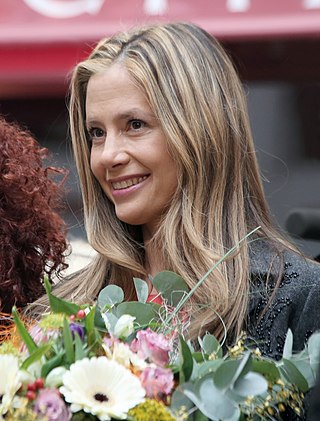
Mira Katherine Sorvino is an American actress. She won the Academy Award and Golden Globe for Best Supporting Actress for her performance in Woody Allen's Mighty Aphrodite (1995).

Gentlemen Prefer Blondes is a 1953 American musical comedy film directed by Howard Hawks and written by Charles Lederer. The film is based on the 1949 stage musical of the same name, which in turn is based on the 1925 novel of the same name by Anita Loos. The film stars Jane Russell and Marilyn Monroe, with Charles Coburn, Elliott Reid, Tommy Noonan, George Winslow, Taylor Holmes and Norma Varden in supporting roles.
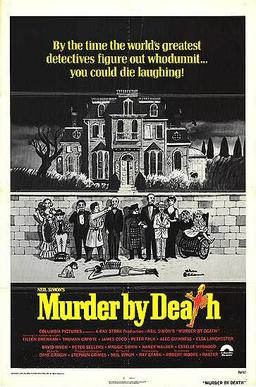
Murder by Death is a 1976 American comedy mystery film directed by Robert Moore and written by Neil Simon. The film stars Eileen Brennan, Truman Capote, James Coco, Peter Falk, Alec Guinness, Elsa Lanchester, David Niven, Peter Sellers, Maggie Smith, Nancy Walker, and Estelle Winwood.

How to Marry a Millionaire is a 1953 American romantic comedy film directed by Jean Negulesco and written and produced by Nunnally Johnson. The screenplay was based on the plays The Greeks Had a Word for It (1930) by Zoe Akins and Loco (1946) by Dale Eunson and Katherine Albert.
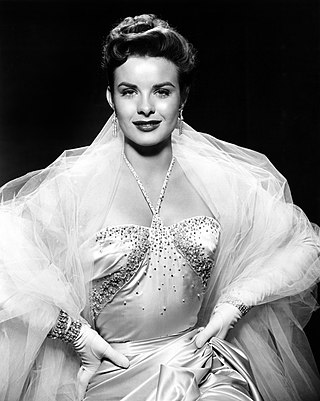
Elizabeth Jean Peters was an American film actress. She was known as a star of 20th Century Fox in the late 1940s and early 1950s, and as the second wife of Howard Hughes. Although possibly best remembered for her siren role in Pickup on South Street (1953), Peters was known for her resistance to being turned into a sex symbol. She preferred to play unglamorous, down-to-earth women.

Mistella Rowe is an American actress. She is best known for portraying the perky, squeaky-voiced blonde on the American television series Hee Haw for 19 years, often appearing as Junior Samples's assistant during used-car comedy segments. Rowe and other "honeys" on the series were notable for performing in cleavage-inducing halter tops, hot pants, and country-style minidresses. Rowe also starred in the 1978 Hee Haw spin-off Hee Haw Honeys, cast with then-newcomer Kathie Lee Gifford as the singing daughters of truck stop diner owners portrayed by Hee Haw regulars Lulu Roman and Kenny Price. Rowe later appeared in a national road show version of the series entitled Hee Haw Honey Reunion.
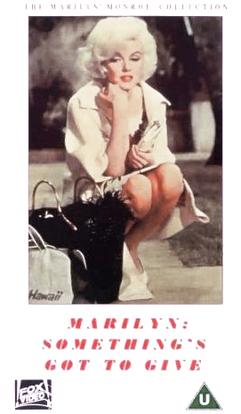
Something's Got to Give is an unfinished American feature film shot in 1962, directed by George Cukor for 20th Century Fox and starring Marilyn Monroe, Dean Martin and Cyd Charisse. A remake of My Favorite Wife (1940), a screwball comedy starring Irene Dunne and Cary Grant, it was Monroe's last work, but from the beginning of its production it was disrupted by her personal troubles, and after her death on August 4, 1962, the film was abandoned. Most of its completed footage remained unseen for many years.
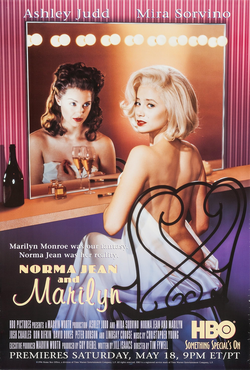
Norma Jean & Marilyn is a 1996 American biographical drama television film directed by Tim Fywell, based on the 1985 book Goddess, the Secret Lives of Marilyn Monroe by Anthony Summers. The film stars Ashley Judd as Norma Jean Dougherty and Mira Sorvino as Marilyn Monroe. It premiered on HBO on May 18, 1996.
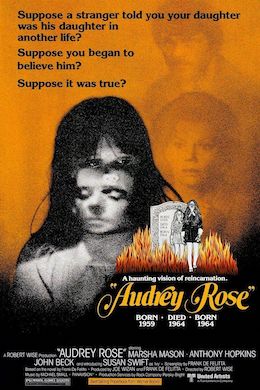
Audrey Rose is a 1977 American psychological horror drama film directed by Robert Wise and starring Marsha Mason, Anthony Hopkins, and John Beck. Its plot follows a New York City couple who are sought out by a stranger who believes their adolescent daughter is a reincarnation of his deceased one. It is based on the 1975 novel of the same name by Frank De Felitta, who also adapted the screenplay.
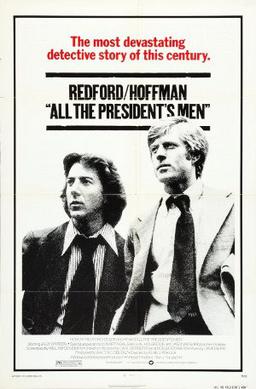
All the President's Men is a 1976 American biographical political thriller film about the Watergate scandal that brought down the presidency of Richard Nixon. Directed by Alan J. Pakula, with a screenplay by William Goldman, it is based on the 1974 non-fiction book by Carl Bernstein and Bob Woodward, the two journalists investigating the scandal for The Washington Post.
American actress Marilyn Monroe's life and persona have been depicted in film, television, music, the arts, and by other celebrities.

I Married a Woman is a 1958 American comedy film made in 1956, directed by Hal Kanter, written by Goodman Ace, and starring George Gobel, Diana Dors, and Adolphe Menjou. The picture was produced by Gobel's company, Gomalco Productions. I Married a Woman also features John Wayne in a cameo role as himself. It was filmed in RKO-Scope and black and white except for one of Wayne's two scenes, which was shot in Technicolor. The film's original title was So There You Are. The film was a box-office disappointment, which hurt the careers of Dors and Gobel.
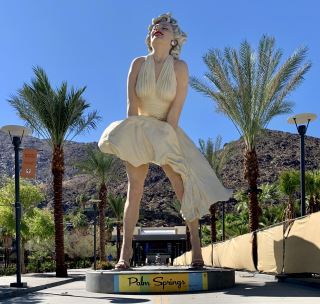
Forever Marilyn is a giant statue of Marilyn Monroe designed by Seward Johnson. The statue is a representation of the image of Monroe taken from Billy Wilder's 1955 film The Seven Year Itch. Created in 2011, the statue has been displayed in a variety of locations in the United States, as well as in Australia.

Marilyn: The Untold Story is a 1980 television film, about the life of the 1950s sex symbol-movie star, Marilyn Monroe. The feature stars Catherine Hicks as Monroe; Richard Basehart as her early-career agent Johnny Hyde; Frank Converse as her second husband Joe DiMaggio; Jason Miller as her third husband Arthur Miller; Kevin Geer as her first husband James Dougherty; Viveca Lindfors as her acting coach Natasha Lytess; and Sheree North as her mother Gladys Pearl Baker.
Goodnight, Sweet Marilyn is a 1989 film by director Larry Buchanan. The film is a follow-up to his 1976 film Goodbye, Norma Jean, and starred Misty Rowe reprising her role as the young Marilyn Monroe.
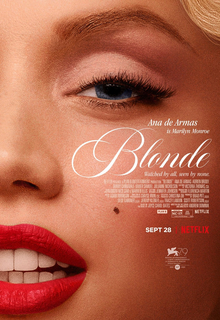
Blonde is a 2022 American biographical psychological drama film written and directed by Andrew Dominik, based on the 2000 novel by Joyce Carol Oates. The film is a fictionalized take on the life and career of American actress Marilyn Monroe, played by Ana de Armas. The cast also includes Adrien Brody, Bobby Cannavale, Xavier Samuel, and Julianne Nicholson.

James Edward Dougherty was an American police officer, the first trainer of Special Weapons and Tactics. He is best known as the first husband of actress Marilyn Monroe.

Gladys Pearl Monroe, also known as Gladys Pearl Monroe Baker Mortensen Eley, was the mother of American actress Marilyn Monroe. Born in Mexico, Baker grew up in the Los Angeles metro area. Her father died in 1909 after suffering from mental illness and alcoholism.
Marilyn! The New Musical, is a musical with a book by Tegan Summer, music by Gregoy Nabours, and lyrics by them both. It is based on the life of Marilyn Monroe, and utilizes people and events from the golden age of Hollywood.
















